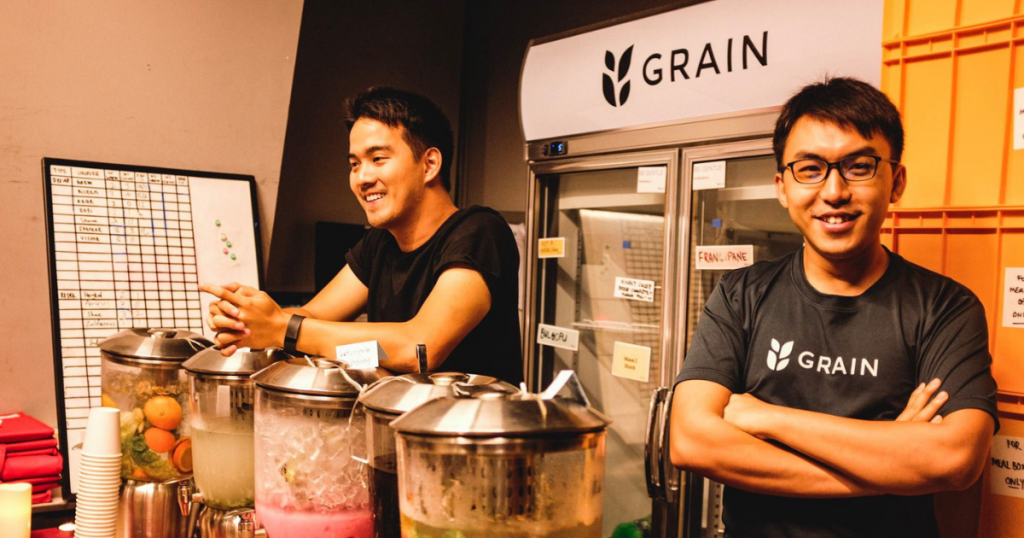Singapore food tech startup Grain secured US$10 million in a Series B funding led by Singha Ventures, the corporate venture capital fund of Singha Corporation that’s part of Boonrawd Brewery Group, Thailand’s leading F&B conglomerate.
The round is also participated by new investors like Genesis Alternative Ventures, Sassoon Investment Corporation, K2 Global, FoodXervices, and Majuven.
Returning investors include Openspace Ventures, Raging Bull, and Cento Ventures.
The statement added that Ozi Amanat, founder of K2 Global, is an early Spotify investor and has also invested in, among others, Impossible Foods, Airbnb, and Uber, that’s in the middle of its IPO process.
According to Sung, co-founder and CEO of Grain, returning investors are seeing the value in the firm’s continued “solid year-on-year growth” and sound fundamentals since their Series A.
The fresh funds, which is a mix of equity and venture debt, will be used to build infrastructure, in the form of a bigger space with more automation, to support revenue of USD$100 million.
Grain also plans to use it to expand their satellite Kitchen Hubs (or, ghost kitchens) in various parts of Singapore which will help lower their delivery costs, beef up their R&D team, and expand to other Asian cities.
With this relationship with Singha, Grain can utilise Singha’s extensive F&B network across the country, including logistics and distribution, to bring innovations to consumers, Sung explained.
Bhurit Bhirombhakdi, Chairman of the executive board at Singha Ventures, said that they see great potential in Grain.
“[We] believe that our collaboration will help Grain expand in Southeast Asia and realise their regional vision.”
Sung confirmed that Grain will be expanding to Bangkok “later this year with Singha”, and similar to what they do in Singapore, Grain will offer food delivery and chef-crafted meals that will be designed to suit local tastes.
Grain, ranked fifth on Singapore’s fastest growing companies according to a study done by The Straits Times and Statista, said in the statement that it has achieved profitability in December 2018.
“This is a huge milestone for us, because it proves that Grain has what it takes to be a sustainable company,” said Sung.
“We want to disrupt the F&B landscape and evolve with consumer preferences, but also have solid fundamentals.”
On what did Grain do that set them apart from other food startups, Sung shared that last year’s strategy was a focus on fundamentals – putting their heads down and doing the “less sexy” work.
“We made sure food cost was well within the industry benchmark, cut budgets, rebuilt our operations, increased delivery fees, reduced service areas, got tempted by ICO/Blockchain, and focused on polishing our existing products,” he revealed.
“When we heard news about our competition going overseas, competitors marketing aggressively in the same areas as us, we had to force ourselves to turn the blinds on and focus on [the] fundamentals.”
Grain was started in 2014 to answer the question of, “What to eat?”, Sung recounted.
“We want to help people eat better every day – from creating dishes our customers love to designing the perfect menu to going the extra mile to make your meal unforgettable.”
Their mission to improve lives through meaningful food experiences hasn’t changed.
When they first started, the challenge they faced was to find out what people want and to get more people to know about Grain.
“Now, there’s fiercer competition with the food platform players like Grab Food and Deliveroo that are driving up the cost of acquiring customers – we differentiate by doubling down on building a strong online food brand,” he shared.
“Challenges are still mostly internal. Cooking and delivering for thousands of people is very different from just a few hundred each day. We also have a 100+ size team which means a very different monster.”
B2B customers now make up 60% to 70% of Grain’s revenue, and sales have grown over 10x since the company’s Series A round in 2016.
In 2018, sales grew by over 200%, according to Sung.
On a possible collaboration with Sassoon Investment Corporation, the family office of the Sassoon family who are shareholders of The Coffee Bean & Tea Leaf, Sung said that they are “open to the possibility of selling Grain’s products at their outlets”.
This year, Sung added that consumers can expect new product lines, tech-enabled storefronts, more pickup points, and faster and better service.
Featured Image Credit: Grain Singapore










